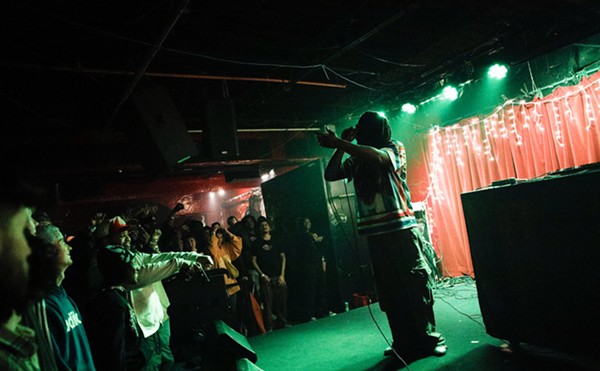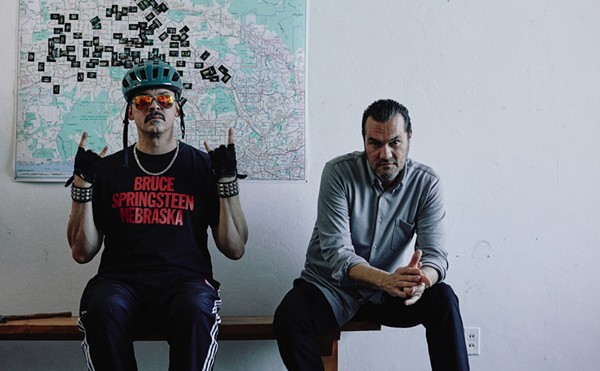"Well, I think obviously I had more say." This is Dan Auerbach's assessment of the difference between his new solo album and the music he's recorded as the singer-guitarist half of the Black Keys. Released February 10, Keep It Hid represents no deliberate move on his part to distance himself from the sound of the celebrated Akron-based indie-blues duo. Neither is it a "concept" album in any conventional sense. Auerbach says simply, "It's a Dan Auerbach record."
Auerbach gives the impression that his solo career can peacefully coexist with the Black Keys.
"[Black Keys drummer] Pat [Carney] brings a huge element to whatever I throw at him," says Auerbach. "Know what I mean? It's kind of undeniable that since we were kids, when we'd get together, we'd start making music that sounds like us. But there's a certain way that I learned how to play that's how I play. It's what I love to do. I'm not tryin' to hide from it."
What Auerbach embraces on Keep It Hid are roots he's been hinting at throughout the Keys' catalog, roots discovered by way of his music-loving family. The brash, unapologetic garage-band blues that he and Carney have elevated to high art is but one ingredient in a musical mulligan in which diverse roots sounds commingle and collide in ways that seem like they wouldn't work, but they grab the ear nevertheless. Bluegrass, soul and vintage R&B are mashed up with sounds of early-'70s psychedelia. With its short and bittersweet content and plainspoken delivery, the acoustic leadoff track "Trouble Weighs a Ton" speaks to the best of traditional country and folk. The unlikely follow-up is the decidedly more Keys-like rocker "I Want Some More." The sonic contrast is no accident.
"I like starting records off with something quiet," he explains. "It sets the volume. It sets the tone. It gets you focused. [I] wanted the first song to be a little bit quieter than the rest of the record, so when 'I Want Some More' hits you, it makes it even more loud. I don't know; it might be lost on the iTunes generation. I know there's still people who listen to guitar albums on headphones. I guess I sort of kept them in mind."
One might guess that the garage-band inventiveness of his early days was also kept in mind as Auerbach describes his dialogue with drummer Bob Cesare on the Bo Diddley-like "Heartbroken, in Disrepair."
"I was playing guitar with a tremolo," he says. "We were playing live, and I pointed the guitar amp at him and Bob literally played along to the rhythm of the tremolo, which is like insane. Which I couldn't even comprehend being able to do."
Considering its beginnings as a stockpile of accumulated songs, the album's cohesiveness would seem like a long shot. That is, until Auerbach's own confidence is factored in. "[I had] about 20 songs that I thought were real keepers, and about 35 altogether. I sort of had my mind made up which songs were gonna make the album. It was all intentional, every little twist and turn on the record. And it's really split up like side A and side B on an LP. "
Set up with his own studio and label, making records is a priority for Auerbach. His seemingly nonstop schedule of Black Keys and now solo commitments has been punctuated with production credits for other artists, including the Buffalo Killers and the San Antonio-based Hacienda. That band, along with Keep It Hid session drummer Cesare, are providing backup on his 10-city tour. It's a safe bet that, once off the road, the man will be at it again in the studio.
"It's just what I do, y'know?" he says. "Whether I had a record deal or not, it's what I'd be doing. If I just had a nine-to-five, I'd come home and I'd play music."










